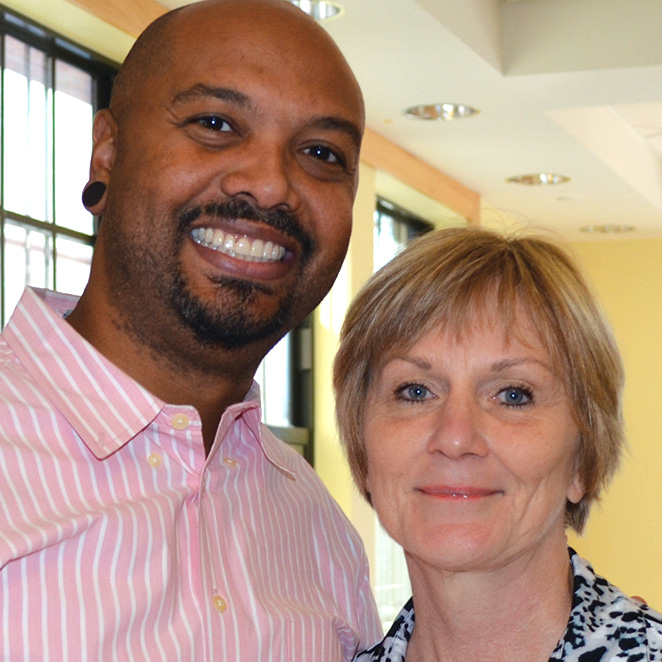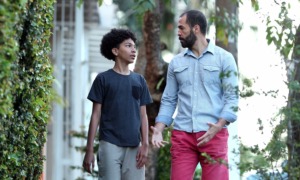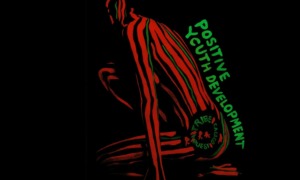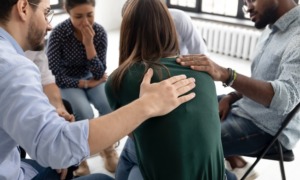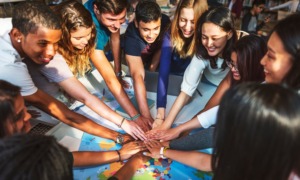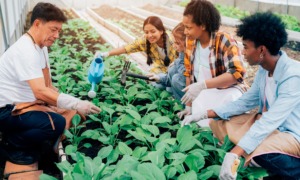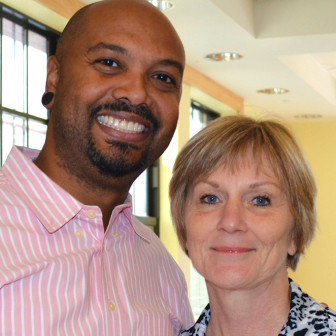
Oman Frame and Martha Caldwell
A line of 60 eighth graders spans the campus green. Side by side, they hold onto each other’s hands. Sam*, a white male, is standing next to Luis*, a Mexican-American immigrant. “Step forward if your parents own your home,” the facilitator calls. Sam steps forward, and he tightens his grip on Luis’ hand.
“Take one step back if you have ever been followed or questioned by security while shopping.” Luis takes a step back, and though Sam tries to hold on to his hand, the distance between them is too great and he feels Luis’s hand slip.
“Take a step forward if you can arrange to be in the company of people the same race as you most of the time,” the facilitator calls. Sam steps forward, and as the gap between them widens, he becomes aware of a sinking feeling in his stomach. He looks back and sees that he has moved ahead of all of the girls and students of color.
Sam is beginning to realize his privilege. On one hand, he wants to keep up with the boys ahead of him. On the other hand, when he realizes many of his classmates have not had his advantages, he feels guilty.
In our “Inquiry into Identity” class, students explore personal experiences with race, class, gender and other socially constructed identities. They learn about themselves, and in the process, learn about each other. They begin to see the bigger picture of how social oppression operates in institutions like government, economics, politics, religion and schooling. Along the way, many of them commit to each other as advocates, allies and activists.
In a nation divided by demographics, conversations about race, class and gender are almost always emotionally charged. Yet, understanding powerful feelings can mean the beginning of insight. We ask our students to delve into their personal identities and invite their emotional lives to the forefront. Before they can understand social theory, histories, politics and current events, they must first learn to honor, accept and support their own and each other’s feelings. They tell us year after year that the connections they make with each other are the most meaningful work they do in school. As teachers, we certainly see that learning about each other produces their most profound insights.
These young people come to us raw, ragged and ready to share their truths. We encourage them to take risks, lean into the discomfort, honestly share the deeper parts of themselves and let themselves be truly known. Through dialogues, discussions, writing and poetry, they tell their stories. Students of color share their resentment at being watched in stores by clerks. Girls share the hurt of being shut down by sexual slurs. GLBTQ students share the pain of hiding and the fear of coming out.
Students who tell their stories are relieved to have a place to share. Students who listen go through a transformation from guilt to empathy to advocacy to action.
When students begin to share, their feelings may initially intensify, but they emerge with new insights and a stronger sense of self. They often recognize their own feelings reflected in each other’s stories and are immeasurably reassured by the realization that they are not alone. As they mirror each other’s experiences, they begin to form deeper connections and build supportive alliances that transcend differences. These connections serve their need to belong and counteract relational aggression.
Our middle-school students relate what they hear from each other to issues in the wider world. When African-American males describe being followed by security guards and the police, their white friends may initially be surprised, but hearing these first-hand accounts grants them a deeper perspective on events in Ferguson and New York. Inspired by feelings of solidarity, our students devour material about race bias in the criminal justice system — from statistics on prison demographics by race to the history of the peonage system following the Civil War, to the school-to-prison pipeline.
A depth of caring stems from their relationships and gives rise to a growing sense of personal agency. They learn to define themselves according to values they hold dear, rather than allowing themselves to be defined by the harmful stereotypes prevalent in society. They become independent thinkers and social critics. They seek solutions to produce social change.
Since 2009, our work has grown beyond our classrooms to include teaching our facilitation process to other educators — in and outside of schools. Our trainings provide a forum for conversations that are rarely broached, yet utterly compelling in their potential to stimulate growth and change — for educators and students.
To do the world-changing work we are all here to do, we begin by building supportive communities. Deep and sustained relationships with like-minded people who share our commitment and understand our values allow us to see ourselves through new eyes. When we share our stories, we are transformed.
*Names changed.
Oman Frame and Martha Caldwell teach at the Paideia School in Atlanta, and consult with schools and offer workshops for teachers, students and community leaders, including The Summer Diversity Institute for Educators. See ichangecollaborative.com for more information.


